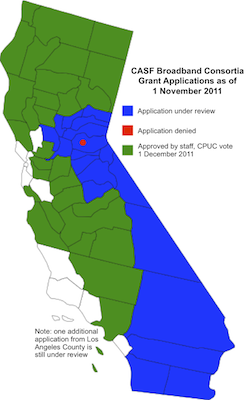
California Public Utilities Commission (CPUC) staff have finished their initial review of the 15 regional consortia grant applications that were filed in August. Seven consortia have been conditionally approved and the full commission will vote on a formal funding resolution on 1 December.
Legislation approved last year and implemented by the CPUC this year sets aside $10 million from the California Advanced Services Fund (CASF) to support regional groups that promote broadband deployment and adoption in rural and urban areas.
Applications from rural groups tended to be more focused on finding ways to encourage broadband build-outs in their areas, while urban applications were more focused on encouraging more people to use broadband in more ways, particularly in underserved communities.
Generally, the CPUC is only allowing one consortia for any given geographical region and limiting grants to $150,000 per year for three years. Most of the requests were for the $150,000 maximum, or thereabouts. The one exception is Los Angeles County. Because of its size and complexity, multiple consortia and sub-consortia are being considered for funding. Two applications were received from LA County. A large one with several sub-consortia is included in the first seven, with $448,843 earmarked for the first year. A second, smaller one is still under review.
The seven that will go before the commission next month are:
- Central Coast Broadband Consortium: Monterey, Santa Cruz, San Benito.
- East Bay Broadband Consortium: Alameda, Contra Costa, Solano.
- Los Angeles County Regional Broadband Consortia: Los Angeles County – 5 distinct sub-regions under the LACRBC umbrella.
- Northeastern California Connect Consortium: Butte, Lassen, Modoc, Plumas, Shasta, Siskiyou, Tehama.
- Redwood Coast Connect: Humboldt, Del Norte, Mendocino, Trinity.
- San Joaquin Valley Regional Broadband Consortium (California State University, Fresno): San Joaquin, Stanislaus, Merced, Madera, Fresno, Kings, Tulare, Kern.
- Upstate California Connect Consortium: Colusa, Glenn, Lake, Sonoma.
The Central Coast Broadband Consortium’s project was developed with the assistance of Tellus Venture Associates, and we were the principal author of the grant application.
A second group of seven is also moving ahead in the process, but have some additional work to do. Those seven are:
- California’s One Million NIU (New Internet Users) Coalition: Various “hubs” in Los Angeles area.
- Central Sierra Connect Consortia: Amador, Calaveras, Tuolumne, Mariposa, Western Alpine.
- Connected Capital Area Broadband Consortium: Sacramento, Sutter, Yolo, Yuba.
- Eastern Sierra Connect: Mono, Inyo, Eastern Kern.
- Gold Country Broadband Consortium: Sierra, Nevada, Placer, El Dorado, Eastern Alpine.
- Inland Empire Regional Broadband Consortium: San Bernardino, Riverside.
- San Diego Imperial Regional Broadband Consortium: San Diego, Imperial.
Only one application was rejected completely. It was from a small group in Eldorado County that wanted to use the money to start building a FTTH project. Since the consortia grants can’t be used for network construction and because a larger, more inclusive consortium application also covers El Dorado County, Camino Fiber Network Cooperative ended up the sole loser.
CPUC staff have moved quickly to process these lengthy and, in many cases, intricate applications. The first group of seven still have work to do before any money arrives. The draft resolution gives them 15 days from the adoption of the resolution to address concerns that staff have raised. Remaining questions include defining deliverables and work plans and schedules. Assuming that happens, start-up money (10% of the first year’s budget) could arrive in January.
Grants for the second group of seven will go before the commission at a later meeting. They’ve been given 30 days to solve a longer list of issues identified by staff. But most, if not all, are expected to be approved early in the new year.
